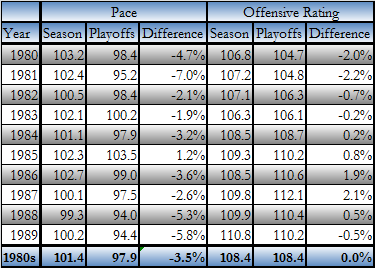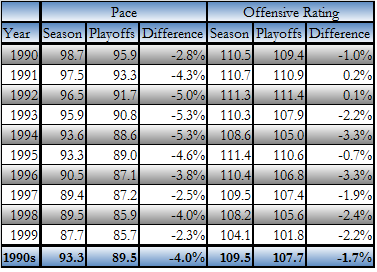statforthat wrote:I am the author of the post in question. Mystic, your concerns have already been taken into account. The pace and offense rating stats are for the playoff teams only. Therefore, the tables do show a valid comparison of regular season defense to playoff defense.
Well, in that case I would like to see your raw data, because using basketball-reference.com numbers gives me different numbers than yours. In both of my examples you get a BETTER offensive rating for the playoff teams against other playoff teams, while I get worse numbers. My result is something we can expect, yours is quite the opposite.
In addition to that you wrote as an answer to Elgee that ORtg and DRtg would be the same. For your test it is not the case, because you are comparing an sample with "only playoff teams in the regular season" with a sample "only games in the playoffs", the teams played different minutes in playoffs, thus your weighted values from the regular season will give you most likely a different ORtg and DRtg. The regular season sample shows a difference in ORtg and DRtg for those teams. And I'm still not convinced that you extracted the games between playoff teams only from the rest for your regular season numbers. The expected value in the playoffs would be rather the average of the ORtg and DRtg of the playoff teams. When a team with a 106 ORtg plays a team with a 100 DRtg, we can expect the offensive team to be more or less at 103 ORtg in the end, our expectation shouldn't be 106.
The teams are playing better overall teams in average in the playoffs, thus a drop is expected just due to better opponents. As Paydro made the point clearer: Against better opponents in the regular season, the teams might be willing to also play more motivated on defense as against the non-playoff teams.




















